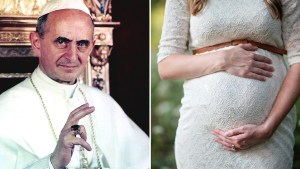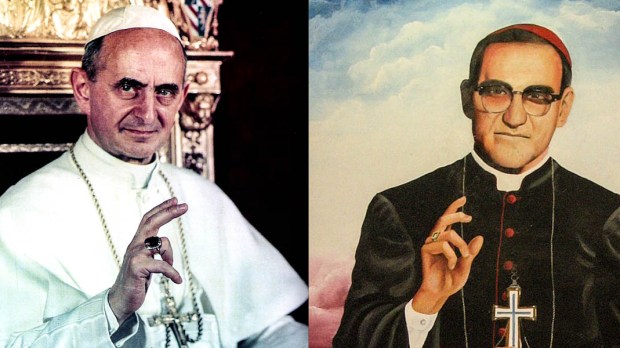Archbishop Oscar Romero, Pope Paul VI, and now Pope Francis all put the Gospel into practice through love for those who are poorest, said Roberto Morozzo della Roca, biographer of Archbishop Romero, and Msgr. Guido Mazzotta, Consultor of the Congregation for the Causes of Saints and postulator of the cause of Paul VI, at a press conference on October 4. Paul VI and Archbishop Romero will be canonized on October 14.
According to Morozzo, a certain “positive Latin American patriotism” is present in both Pope Francis and Archbishop Romero. Mazzotta, on his part, mentioned the Argentine pontiff’s agreement with the vision of evangelization present in the exhortation Evangelii nuntiandi (1975) of Paul VI. This magisterial document insists on the role that every Christian should play, not just ordained priests.
All three show a focus on putting the Gospel into practice through the love of the poor. Archishop Romero did this by defending the poorest people in society against the brutal repression of the regime in El Salvador at the time. For Paul VI, this was expressed in particular when he decided to sell the pontifical tiara to offer the proceeds to charity. In general, the pontiff was convinced that it was necessary to love those who are poorest “more and more, in order to serve them better.”
Paul VI: Spiritual director
During the process of canonization of Giovanni Battista Montini, Mazzotta explained, his private writings could not be used. It is above all his pontifical experience that has served as material for the cause. His specialty, stressed the prelate, was always the education of young people. Mazzotta himself was regularly contacted by the pontiff, who wanted to know about the type of educational work being implemented in his parish.
Paul VI was also a great spiritual director. “The best part of the process of canonization was reading the testimonies of the faithful whom he spiritually directed,” said the postulator.

Read more:
Pope known for teaching on birth control brings healing of another unborn baby
A very close connection between the two to be canonized
Archbishop Romero, Morozzo said, had a “very deep” relationship with Paul VI. “He was very faithful to him and considered his magisterium to be a reference point.”
The biographer also pointed to the religious reasons for the assassination of the Salvadorian bishop, affirming that it was “in odium fidei” (motivated by hatred of the faith)—an indispensable condition for the recognition of his martyrdom.
According to Morozzo, “Archbishop Romero sought to defend the people against the military junta for religious reasons, because his choices were motivated by Christian principles.”
The expert on Archbishop Romero noted the difficulties experienced during the process of beatification and canonization, especially during the papacy of Pope Benedict XVI (2005-2013). “Upon returning from Brazil in 2007, the German Pope said that Romero was a saint, but a problem remained: there was no unity around his name.” Indeed, for a long time, a division existed regarding the political positions of the Archbishop of San Salvador. Nevertheless, it was Benedict XVI, said Morozzo, who unblocked his cause of canonization.

Read more:
When the world’s unmet needs are overwhelming, the Archbishop Romero Prayer keeps us steady

